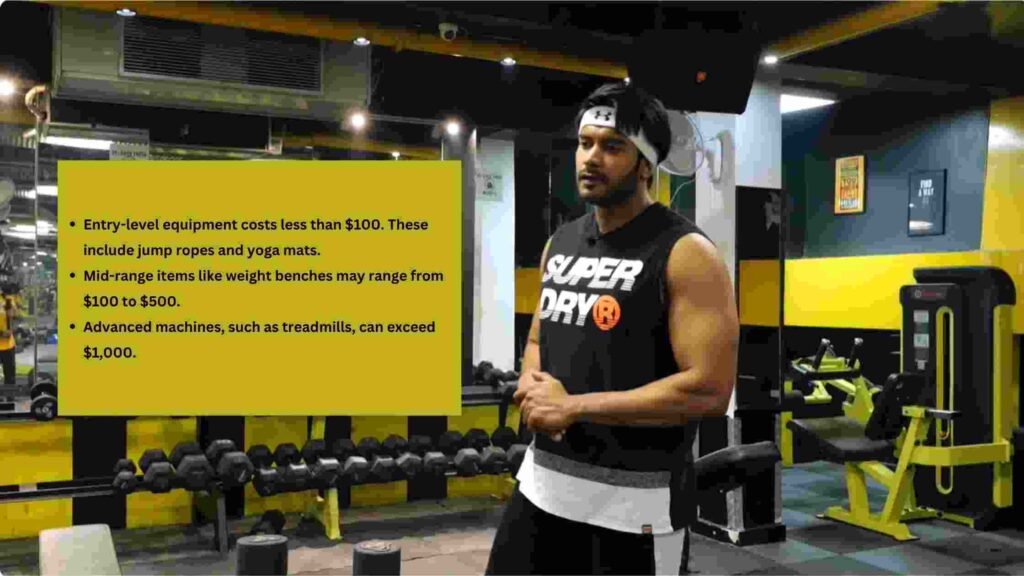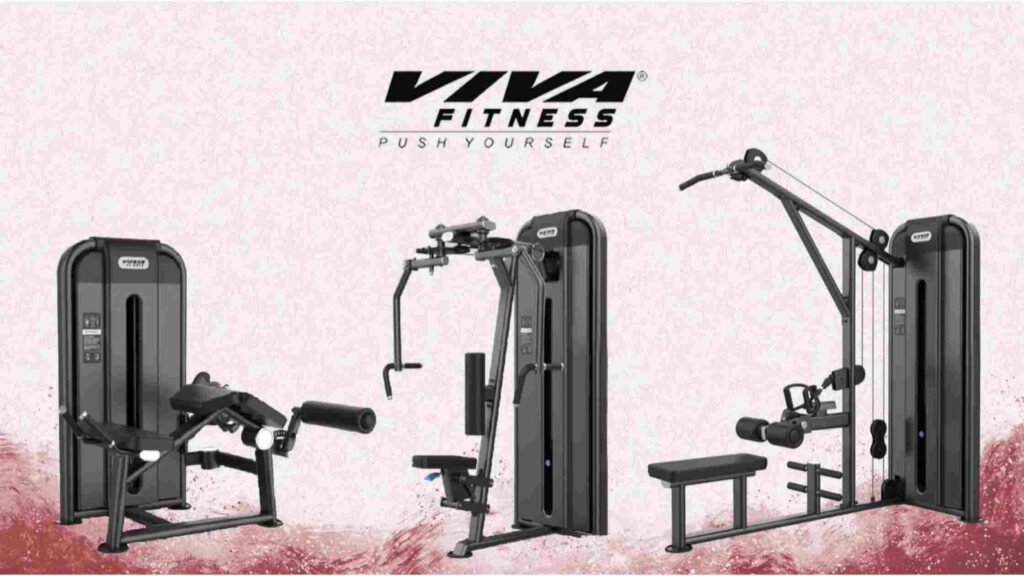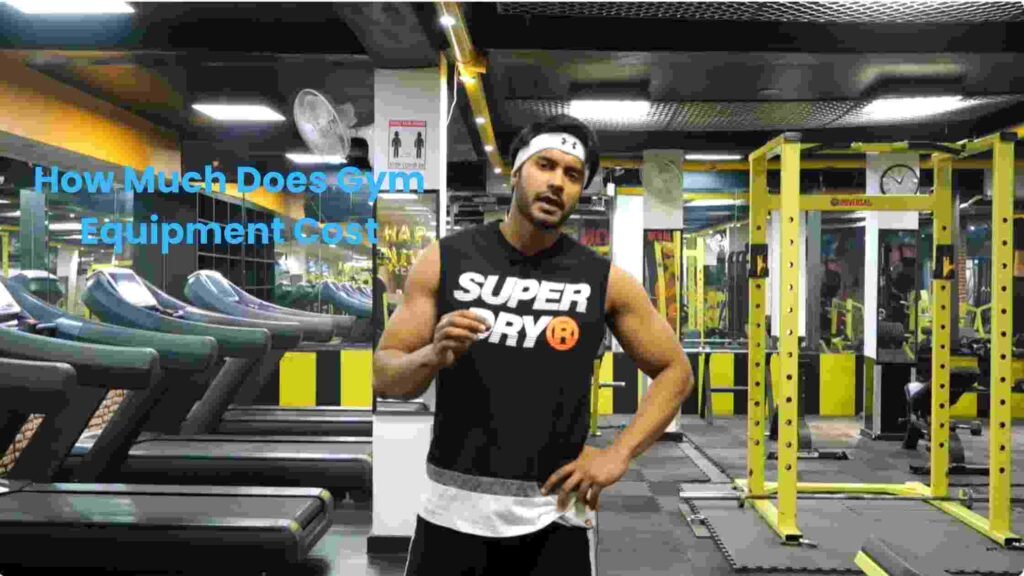Gym equipment costs can range from under $100 for basic items to well over $20,000 for advanced commercial machinery (U.S., 2025). The price varies greatly based on equipment type, quality, and brand.
Setting up a home gym or outfitting a commercial fitness center requires a significant investment in gym equipment. The costs fluctuate depending on whether you’re purchasing small items like dumbbells and yoga mats, or large machines such as treadmills and squat racks.
Budget-friendly options are available, particularly for those looking to create a simple home workout space. Conversely, professional gym owners often opt for durable, high-end equipment to withstand heavy usage and maintain their clientele’s satisfaction.
Investing wisely in the right equipment can pave the way for both personal fitness success and business growth. When selecting gym gear, it’s crucial to balance cost with quality to ensure long-term value and effectiveness in workout regimes.
The Cost Spectrum Of Gym Equipment

Gym equipment comes with a wide range of prices. Beginners and experts have diverse options. Quality and features affect costs. This section breaks down these costs.
From Affordable To Premium Ranges
Gym equipment prices vary greatly. The spectrum spans from basic gear to high-end machines. Individuals can find options matching their budgets and fitness goals.
- Entry-level equipment costs less than $100. These include jump ropes and yoga mats.
- Mid-range items like weight benches may range from $100 to $500.
- Advanced machines, such as treadmills, can exceed $1,000.
Premium options feature the latest technology. Prices can soar beyond $2,000. Commercial gyms often invest in these.
Pricing Variations By Equipment Type
Prices depend on the type of equipment. Resistance machines and cardio equipment often have different price tags.
| Equipment Type | Price Range |
|---|---|
| Dumbbells | $20 – $400+ |
| Exercise Bikes | $200 – $2,500+ |
| Elliptical Trainers | $300 – $3,000+ |
Consider functionality and durability. Higher costs often reflect longer-lasting equipment. Brands, materials, and tech features affect prices too.
Home Vs. Commercial Gym Equipment

Choosing between home and commercial gym equipment is often a tale of budget, space, and usage intensity. High-grade machines offer commercial durability but come with a heftier price tag. Conversely, home gym equipment might fit snugly into smaller spaces and budgets but may not stand up to heavy usage over time. Understanding the cost implications of each is vital when deciding which equipment fits your fitness journey.
Investment Differences
Home gym equipment tends to be more cost-effective, designed for occasional use, and suits tighter budgets.
- Affordable treadmills: From $500
- Basic weight sets: Around $200
- Yoga mats: As little as $20
Commercial gym equipment features robust construction to handle repetitive, daily use, often reflected in a higher price point.
| Equipment Type | Cost Range |
|---|---|
| Professional treadmills | $3,000 – $22,000+ |
| Commercial weight stations | $2,000 – $5,000 |
| Heavy-duty exercise bikes | $1,500 – $5,000 |
Durability And Warranty Considerations
Home gym equipment warranties vary. Budget models often include shorter coverage (around 1–2 years for parts), while some premium home lines offer longer terms (for example, up to 10 years on parts and about 1 year on labor), depending on the brand and product line.
Commercial equipment coverage often includes long frame warranties (10 years to lifetime). Typical parts coverage runs about 2–5 years, with labor commonly around 1 year, though specifics vary by manufacturer and model.
Calculating Your Fitness Goals And Budget
Ready to shape your body and pep up your spirits? Start by fitting gym equipment into your finance frame! Smart planning ensures your cash and fitness goals align perfectly. Let’s figure out how to smash your fitness targets without sidelining your savings.
Aligning Your Investment With Objectives
Think about your gym goals. Are you chasing strength, flexibility, endurance, or all three? Your objectives impact the gear you need. Let’s explore how:
- Strength Goals: You might eye weight racks, benches, and resistance machines.
- Flexibility Goals: Yoga mats, stability balls, and stretching aids are your go-to.
- Endurance Goals: Consider treadmills, bikes, or rowing machines.
Match equipment priorities with your ultimate fitness achievements. A tailored toolkit can slash unnecessary costs!
Budget Allocation Strategies
Never let budgeting give you a headache. With some smart tactics, you can funnel funds into fitness without financial worry. Here’s a neat trick:
| Steps | Action |
|---|---|
| 1 | Review cash flow |
| 2 | Identify essentials |
| 3 | Research prices |
| 4 | Set a range |
| 5 | Adjust or prioritize |
Beginning with an inventory of your cash in and out gives you clarity. Scout for must-have items first, then contrast prices. Set a spending bracket to keep things in check. If the tally turns out high, reevaluate. See what’s essential and what can wait. This way, you strike a balance between cost and benefit.
Essential Equipment For A Basic Home Gym
Building a basic home gym is a great way to stay fit. It can be simple. You don’t need much. Just a few pieces will do. A basic home gym helps with routine exercise. You can work out anytime. It saves time and money.
Cost-effective Must-haves
A basic home gym needs a few key items. You can get these without spending a lot. Here’s what to include:
- Dumbbells: They are versatile and compact. You can adjust weights too.
- Jump Rope: It’s great for cardio. It takes little space.
- Yoga Mat: It’s not just for yoga. It’s for any floor exercises.
- Resistance Bands: These bands are good for strength training. They’re also easy to store.
Price Breakdown For Starter Kits
Starter kits are a great deal. They have everything you need. Here’s what a kit might cost:
| Item | Price Range |
|---|---|
| Dumbbell Set | $20 – $50 |
| Jump Rope | $5 – $20 |
| Yoga Mat | $10 – $30 |
| Resistance Bands | $10 – $25 |
With these items, a starter gym kit can range from $45 to $125. This makes it affordable to many.
Navigating High-ticket Items
Exploring the realm of gym equipment pricing is a journey through varied terrains of options and quality. The quest to outfit a fitness space, whether personal or commercial, often leads to encounters with pricey investments. Making informed decisions requires an understanding of when extra expense yields long-term value. Here’s a guide on navigating these high-ticket items effectively.
When To Splurge On Premium Machines
Discerning the right time to invest in premium gym machinery involves assessing needs versus wants.
- Determine the frequency of use: Daily or heavy usage warrants higher quality.
- Identify workout goals: Specialized equipment may be necessary for specific fitness objectives.
- Consider the space: Premium machines often come with enhanced design and compact options.
- Research warranties and brand reputation: A robust warranty could mean fewer expenses down the line.
Shelling out more upfront sometimes means saving on maintenance and replacements.
Long-term Cost Benefits Analysis
A strategic approach to purchasing gym equipment weighs initial costs against potential savings.
| Cost Factor | Short-Term Cost | Long-Term Benefit |
|---|---|---|
| Upfront Investment | Higher | Less frequent replacements |
| Quality Equipment | More Expensive | Better performance, durability |
| Operation Costs | Varies | Energy-efficient models save money |
| Warranty | Possibly higher | Lower repair costs |
Analyzing the full lifespan of gym equipment shows that higher initial expenditure often leads to significant savings over time.
Money-saving Tips When Purchasing Gym Equipment

Outfitting a home gym or a commercial fitness center can be quite an investment. But with a few smart strategies, you can save a considerable amount of money. Let’s explore some top tips to keep those dollars in your wallet while still getting quality gym equipment.
Seasonal Sales And Discounts
Time your purchase with seasonal sales to score big discounts on gym equipment. Retailers often offer significant markdowns during:
- New Year promotions: Capitalize on the fitness resolutions crowd.
- Black Friday and Cyber Monday: Look for doorbusters and online specials.
- End of financial year sales: Companies clear out inventory before annual reporting.
Additionally, signing up for newsletters from fitness retailers can alert you to exclusive subscriber discounts and deals.
Buying Secondhand: Dos And Don’ts
Opting for secondhand gym equipment can be a savvy financial move. Nevertheless, it’s important to shop wisely.
Do:
- Inspect equipment thoroughly for any signs of damage or excessive wear.
- Test before buying to ensure everything operates smoothly.
- Research fair pricing to negotiate effectively.
Don’t:
- Ignore the brand and model: Prioritize reputable brands for durability and easier repairs.
- Skimp on safety: Avoid equipment with potential hazards.
- Forget to factor in delivery costs: Heavy machines can be expensive to move.
Maintenance Costs And Their Impact On Budgeting
When budgeting for gym equipment, initial costs are just the starting point. Maintenance expenses play a crucial role in financial planning. Ignoring these costs can lead to unwelcome surprises. Let’s explore routine upkeep and how extending the lifespan of equipment can affect your budget.
Routine Upkeep Expenses
Keeping gym equipment in top condition involves regular investment. Here’s a breakdown of potential upkeep costs:
- Cleaning supplies: Keeping equipment hygienic is a must.
- Minor repairs: Fixing wear and tear extends equipment life.
- Professional servicing: Experts can prevent bigger issues.
Set aside a budget for each to avoid unexpected expenses.
Extending Equipment Lifespan To Save Money
Longer-lasting equipment means less frequent replacements. Follow these tips to save money in the long run:
- Regular maintenance: Stick to the servicing schedule.
- Immediate repairs: Address issues quickly to avoid worsening.
- Use manuals: Follow manufacturer instructions for best practices.
Incorporating these strategies ensures your gym equipment performs better for longer, helping you stretch your budget further.
Leveraging Technology And Apps
Welcome to the digital era of fitness where technology seamlessly integrates with gym equipment, potentially reducing your initial investment costs. Let’s dig into leveraging technology and apps to maximize your workouts while keeping an eye on the budget.
Using Smart Tech To Minimize Equipment Needs
Smart technology transforms traditional workouts into futuristic, efficient fitness experiences. With the rise of integrated equipment, you now can enjoy multiple exercise routines with a single piece of gym apparatus. Here’s how:
- Multi-Purpose Designs: Products with built-in sensors adapt to various exercises, tracking your performance and suggesting improvements.
- Digital Interfaces: Touch screens provide personalized training, reducing the need for multiple machines.
- Connectivity: Devices that sync with mobile apps allow for remote updates and new workout downloads, keeping the gear new and exciting.
Subscription Services Versus One-time Purchases
In the constant battle between subscription services and one-time purchases, the right choice can save you significant money. Compare your options:
| Subscription Services | One-Time Purchases |
|---|---|
| Access to a wide range of workouts and software updates. | Pay once and own the equipment forever. |
| Monthly or annual fees with varying tiers. | Additional costs only if upgrading or repairing. |
| Always have the latest tech at your fingertips. | Technology may become outdated faster. |
Consider your lifestyle, fitness goals, and budget to select the ideal investment approach. While subscriptions offer the latest advancements, owning equipment outright avoids ongoing costs.
Frequently Asked Questions
How Much Will Gym Equipment Cost?
Gym equipment costs can vary widely, typically ranging from under $100 for basic items to over $20,000 for high-end commercial machines. Budget options and used gear can offer savings.
How Much Should I Budget For The Gym?
The budget for a gym membership varies, typically ranging from $10 to $100 per month (U.S.). Factor in joining fees, location, amenities, and your usage frequency when deciding your budget.
How Much Does A Gym Fit Out Cost?
The cost of a gym fit-out can vary widely, typically ranging from $30,000 to over $500,000, depending on the facility’s size and equipment quality.
Why Are Gym Equipment Expensive?
Gym equipment is expensive due to high-quality materials, advanced technology, durable design, and the R&D costs behind them. Brands also factor in assembly, shipping, and warranty services, adding to the overall price.
Conclusion
Understanding gym equipment costs is critical for setting up your fitness space. Prices vary based on quality, brand, and features. Budget wisely and consider long-term value. Remember, investing in your health is priceless. Start with essentials and expand as you go.
Ready to build your dream gym?



3 thoughts on “How Much Does Gym Equipment Cost: Smart Budgeting Tips”
Pingback: How Much Does A Salsa Buisness Cost To Start Up?
Pingback: How Much Are Construction Supervision Costs In Usa?
Pingback: How Much Should Heavy Equipment Repair Cost?